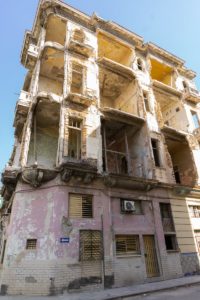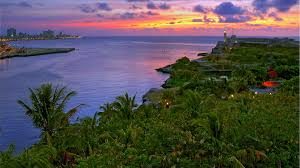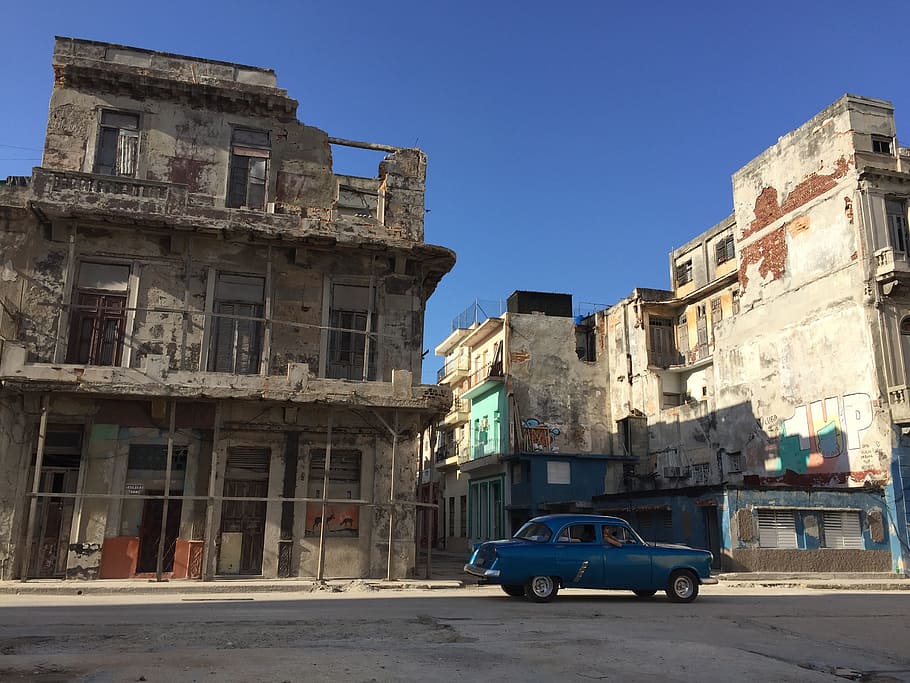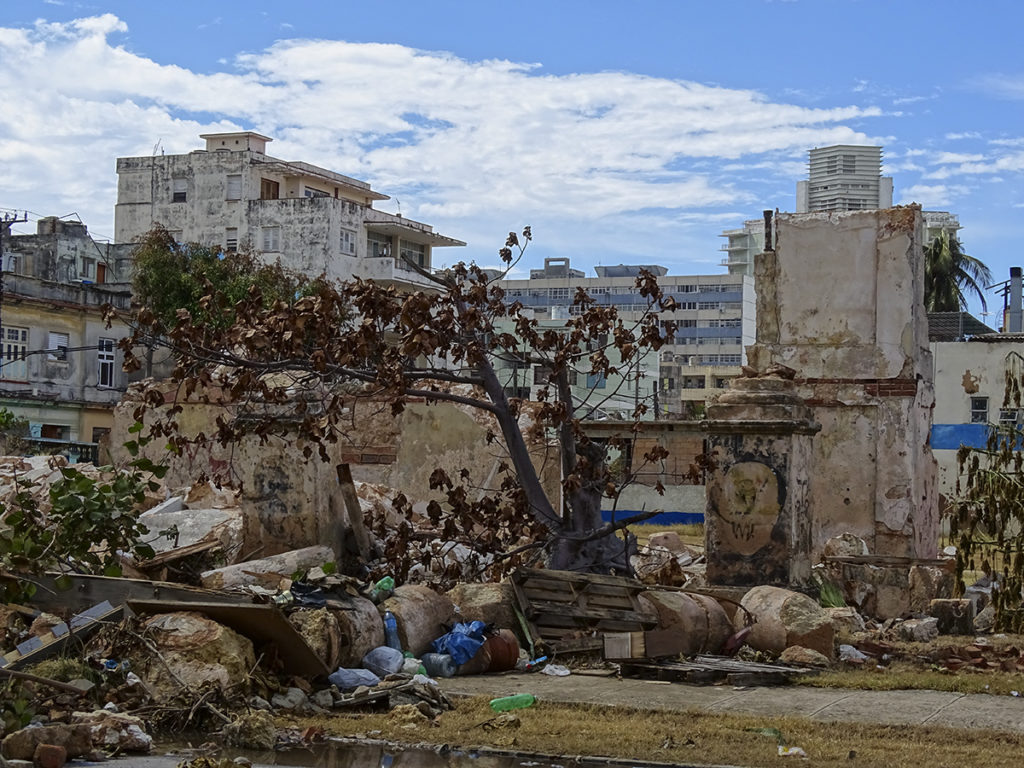OPINIÓN SOBRE CUBA: DE LAS RUINAS QUE NOS DEJAN. PHOTOS
Cuba, otrora joya del Caribe, sufre hoy las consecuencias del régimen cubano. Desde 1959, la revolución de Fidel Castro nos ha llevado poco a poco a la ruina, no solo económica sino también arquitectónica, industrial, social y familiar. Nos dejan un país devastado y endeudado.
EN 1959 CUBA era un país próspero, de acuerdo a cualquier estándar de medición, era símbolo de prosperidad y modernidad en América Latina. Era un país puntero en la implantación de nuevas tecnologías, en el arte, la cultura, los negocios. Pero era un país injusto, gobernado por la sangrienta dictadura de Fulgencio Batista.
Para sacar a Batista del poder los cubanos confiaron en Fidel Castro, que prometía: “No hay comunismo o marxismo en nuestras ideas. Nuestra filosofía política es la democracia representativa y justicia social en una economía bien planificada”. La inmensa mayoría de los cubanos confió en el nuevo mesías y el este los engañó, nos engañó a todos. Los que no creían en la idea tenían dos opciones, o se marchaban o vestían la máscara del fidelismo.
Y a pesar de que Castro prometió no decomisar nada pronto llegaron las olas de expropiaciones. Comenzaron por las grandes compañías extranjeras, las grandes extensiones de tierra, pero llegaron hasta el puesto de fritas del chino de la esquina. Todo, absolutamente todo se nacionalizó. De pronto todo era de todos, o lo que es lo mismo, de nadie. Y así desapareció ese que es el máximo velador de su propiedad, el dueño.Y comenzó la debacle revolucionaria.
Las ciudades, que antaño eran la envidia de toda América Latina, hoy muestran un paisaje que recuerda al de zonas devastadas por conflictos bélicos.
La Habana, con su arquitectura colonial y sus majestuosos edificios, que solían ser testigos de la riqueza y el esplendor de la isla, ahora están en ruinas, despojados de su antiguo brillo.
Calles que una vez resonaron con la música y la alegría, ahora susurran historias de abandono y desesperación.
Los edificios tuvieron dueños que se ocupaban de su mantenimiento, hoy son tierra de nadie sus fachadas, pasillos, escaleras y elevadores. Nadie se ha ocupado pintar, reparar una losa rota, cambiar un bombillo o darles mantenimiento por años. El estado, ese ente superior que controla todo, se olvidó de esto hace años, se limpió las manos. Y las cosas así, solo van de mal en peor.
Los derrumbes son el orden del día en muchos barrios habaneros, esos donde viven los más humildes, mueren niños y adultos por culpa de estos. Y donde se derrumba un edificio queda un solar, o surge un nuevo hotel de la dictadura, para eso sí hay dinero.
EL LEGADO ECONOMICO QUE NOS QUEDA
La industria, otrora pujante, es prácticamente inexistente. Cuba, que en su apogeo fue la mayor exportadora de azúcar del mundo, ahora solo muestra las ruinas oxidadas de centrales azucareros.
Estas estructuras, que en su momento fueron el motor económico de la nación, hoy son mudos testigos de una era que parece haber quedado atrás. La dependencia de las importaciones ha crecido exponencialmente, evidenciando la incapacidad del régimen para mantener una economía autosuficiente.
La agricultura y la agronomía no se quedaron detrás. En 1954 Cuba tenía mas de 5 millones de cabezas de ganado vacuno, o 0.90 reses per cápita. Hoy la mayoría de los cubanos no come carne de res, y los pollos son importados desde el gran “enemigo” del norte.
Fidel prometió carne, leche y huevos para todos, habría tanto que sería casi gratis. Cuán lejos ha quedado la realidad de las enajenaciones del dictador.
Ya ni se produce suficiente café para el mercado nacional. Hoy importamos café de Vietnam, país que aprendió a cultivar café gracias a cubanos que fueron hace años a enseñar las técnicas de cultivo. Ironías del socialismo caribeño.
El impacto medioambiental del régimen ha sido igualmente brutal. La deforestación, la contaminación de ríos y mares, y la falta de políticas sostenibles han dejado una huella imborrable en la rica biodiversidad de la isla. Parajes naturales que solían ser refugio de especies endémicas y atracción para turistas y científicos, ahora enfrentan serias amenazas debido a la negligencia y la falta de visión a largo plazo.
Pero quizás, el impacto más doloroso se observa en las personas. Cuba, una nación que envejece a pasos agigantados, está llena de ancianos que luchan por sobrevivir con pensiones insuficientes. Aquellos que no cuentan con el apoyo de familiares en el extranjero o con alguien que los cuide, se ven en la triste necesidad de pedir limosna o hurgar en la basura en busca de algo que comer
La precariedad económica ha llevado a muchos cubanos a una situación de vulnerabilidad extrema, incapaces de afrontar cualquier gasto imprevisto que surja en su día a día.
EL LEGADO QUE NOS QUEDA
Pero no es solo la depauperación física de las personas, es la destrucción de las familias, divididas por una emigración que se asemeja mucho a un exilio. Durante décadas los que se iban eran considerados desertores, “gusanos”, los que quedaban rompían la comunicación con los que se marcharon, para no ser marcados como desafectos.
Otros, que creían en la idea, se pelearon con sus familiares porque realmente los consideraban traidores. Muchos lamentaron esas decisiones y tuvieron que pedir ayuda a los otrora apestados, muchos exiliados entendieron y aceptaron las disculpas, para estos la familia estaba por encima de todo, pero otros jamás perdonaron a sus familiares.
Un día no estarán, un día serán el pasado, pero el legado del régimen cubano es un país en ruinas, tanto en su infraestructura como en su tejido social. La esperanza de un futuro mejor parece cada día más difícil, ¡es tanto lo que hay que reconstruir! Pero la memoria de lo que una vez fue Cuba, la resistencia y espíritu emprendedor de los cubanos, son testimonios de que la isla puede, y debe, renacer de sus cenizas. Solo tenemos que quitarnos a estos desgraciados de encima.
OPINION ABOUT CUBA: OF THE RUINS THAT LEFT US. PHOTOS
Cuba, once a jewel of the Caribbean, today suffers the consequences of the Cuban regime. Since 1959, Fidel Castro’s revolution has led us little by little to ruin, not only economically but also architecturally, industrially, socially, and familially. They leave us a devastated and indebted country.
IN 1959 CUBA was a prosperous country, according to any standard of measurement, it was a symbol of prosperity and modernity in Latin America. It was a leading country in the implementation of new technologies, in art, culture, business. But it was an unfair country, ruled by the bloody dictatorship of Fulgencio Batista.
To get Batista out of power, the Cubans trusted Fidel Castro, who promised: “There is no communism or Marxism in our ideas. Our political philosophy is representative democracy and social justice in a well-planned economy.” The vast majority of Cubans trusted the new messiah and the East deceived them, deceived us all. Those who did not believe in the idea had two options, either leave or wear the mask of fidelismo.
And despite the fact that Castro promised not to confiscate anything, waves of expropriations soon arrived. They started with the big foreign companies, the big tracts of land, but they got as far as the Chinese fried food stand on the corner. Everything, absolutely everything was nationalized. Suddenly everything belonged to everyone, or what is the same, to nobody. And so the person who is the top watchman for his property, the owner, disappeared. And the revolutionary debacle began.
The cities, which in the past were the envy of all of Latin America, today display a landscape reminiscent of areas devastated by armed conflicts.
Havana, with its colonial architecture and majestic buildings, which used to bear witness to the wealth and splendor of the island, now lie in ruins, stripped of their former luster.
Streets that once echoed with music and joy now whisper stories of abandonment and despair.
The buildings had owners who took care of their maintenance, today their facades, corridors, stairs and elevators are no man’s land. Nobody has taken care to paint, repair a broken tile, change a light bulb or maintain them for years. The state, that superior entity that controls everything, forgot about this years ago, it cleaned its hands. And things like that just go from bad to worse.
Landslides are the order of the day in many Havana neighborhoods, those where the most humble live, children and adults die because of them. And where a building collapses, a site remains, or a new dictatorship hotel rises, for that there is money.
THE ECONOMIC LEGACY THAT LEFT US
The industry, once thriving, is practically non-existent. Cuba, once the world’s largest sugar exporter in its heyday, now shows only the rusting ruins of sugar mills.
These structures, which at the time were the economic engine of the nation, today are mute witnesses of an era that seems to have been left behind. Dependence on imports has grown exponentially, evidencing the regime’s inability to maintain a self-sufficient economy.
Agriculture and agronomy were not far behind. In 1954 Cuba had more than 5 million head of cattle, or 0.90 cattle per capita. Today the majority of Cubans do not eat beef, and chickens are imported from the great “enemy” of the north.
Fidel promised everyone meat, milk and eggs, there would be so much of it that it would be almost free. How far has the reality of the alienations of the dictator been.
Not enough coffee is produced for the domestic market anymore. Today we import coffee from Vietnam, a country that learned to grow coffee thanks to Cubans who went years ago to teach cultivation techniques. Ironies of Caribbean socialism.
The environmental impact of the regime has been equally brutal. Deforestation, pollution of rivers and seas, and the lack of sustainable policies have left an indelible mark on the island’s rich biodiversity. Natural sites that used to be a refuge for endemic species and an attraction for tourists and scientists now face serious threats due to neglect and a lack of long-term vision.
But perhaps the most painful impact is observed in people. Cuba, a nation that is aging by leaps and bounds, is full of elderly people struggling to survive on inadequate pensions. Those who do not have the support of relatives abroad or someone to care for them, find themselves in the sad need of begging or rummaging through the garbage in search of something to eat.
Economic precariousness has led many Cubans to a situation of extreme vulnerability, unable to face any unforeseen expense that arises in their day to day.
THE LEGACY THAT LEFT US
But it is not only the physical impoverishment of people, it is the destruction of families, divided by an emigration that is very similar to an exile. For decades those who left were considered deserters, “worms”, those who remained broke communication with those who left, so as not to be marked as disaffected.
Others, who believed in the idea, quarreled with their relatives because they really considered them traitors. Many regretted those decisions and had to ask for help from those who were once plagued, many exiles understood and accepted the apologies, for these the family was above all else, but others never forgave their relatives.
One day they will not be there, one day they will be the past, but the legacy of the Cuban regime is a country in ruins, both in its infrastructure and in its social fabric. Hope for a better future seems more difficult every day, there is so much to rebuild! But the memory of what Cuba once was, the resistance and entrepreneurial spirit of Cubans, are testimonies that the island can, and must, be reborn from its ashes. We just have to get these bastards off our backs.
Agencies/ Wiki/ CiberCuba/ Luis Flores/ Extractos/ Excerpts/ Internet Photos/ Arnoldo Varona/ www.TheCubanHistory.com
THE CUBAN HISTORY, HOLLYWOOD.



 OPINIÓN sobre Cuba: De las Ruinas que nos Dejan. PHOTOS. * OPINION about Cuba: of the Ruins that Left Us. PHOTOS.
OPINIÓN sobre Cuba: De las Ruinas que nos Dejan. PHOTOS. * OPINION about Cuba: of the Ruins that Left Us. PHOTOS.








